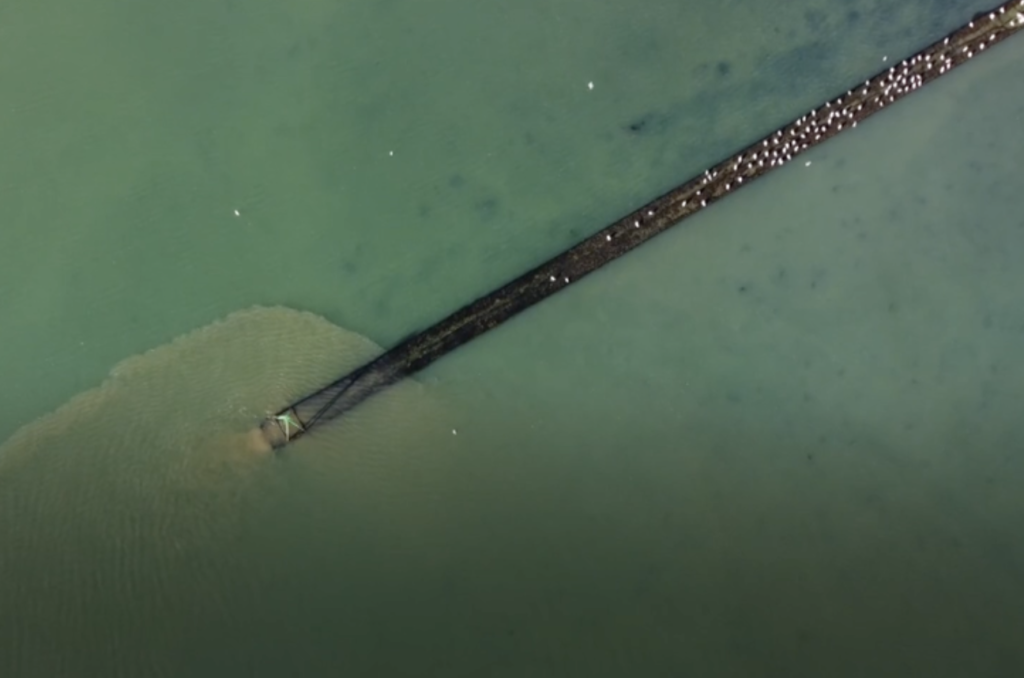Shocking 87.6% increase in sewage discharges into UK waters
 Raw sewage spills into Langstone Harbour. Image courtesy of Chris Pearsall
Raw sewage spills into Langstone Harbour. Image courtesy of Chris Pearsall
The annual water quality report from environmental charity, Surfers Against Sewage (SAS), has revealed that sewage discharges into coastal waters have increased by 87.6 per cent in the last year.
Over the past 12 months (1 October 2020 to 30 September 2021), 5,517 sewage discharge notifications were issued by water companies warning of sewage pollution impacting designated Bathing Waters in England and Wales. Of these, 3,328 discharge notifications were issued during the bathing season (15 May to 30 September).
This increase in discharge of harmful amounts of sewage into our rivers and seas has devastating consequences, not just for the environment, but for the health of water users and local businesses.
Some shellfish companies along the south coast have been asked to recall and stop selling their oysters by the Food Standards Agency, amid fears that contamination from sewage may cause the norovirus. Dorset Oysters, which usually sells between 20,000 and 50,000 oysters a week harvested in Poole Harbour, is currently at a standstill.
Speaking to the BBC’s Farming Today (https://www.bbc.co.uk/sounds/play/m0011rk3), owner Pete Miles says: “We’ve got an antiquated system and they just can’t hold onto the water, so when we get huge down pours now, their [Wessex Water] only option is to pump whatever they got in their system out into the harbour, and that’s normally untreated sewage. This shouldn’t be happening in this day and age.
“Back in November 2019, we were shut down for six months and that nearly wiped us out. There’s no compensation, so we were lucky to just scratch by. And only two weeks ago it happened again, and we were shut for another week. It’s just outrageous. I’m a bill payer as well, and I’m paying for an amenity that’s not doing its job.”
According to the SAS report, in 2020 alone sewage was pumped into rivers and seas nationwide over 400,000 times, totalling over 3 million hours, but few improvements have been made by the water sector.
Captured on film and receiving £90m in fines for illegally dumping raw sewage along the south coast, Southern Water appears to be one the worst offender.
Over the course of the 2021 bathing season, the SAS report says Southern Water was responsible for 1,949 sewage discharge notifications. It is perhaps, therefore, unsurprising that almost 30 per cent of the 286 health reports submitted to Surfers Against Sewage over the last year came from beaches in the Southern Water region.
Last month, campaigners protested outside Southern Water’s head office in Worthing, West Sussex. The protest, organised by Unite, called for the service to be renationalised. “This disgusting behaviour must be stopped,” chair of Unite Community Sussex Coast Branch, Dorothy MacEdo, told BBC News. “We need Southern Water to be bought back into public ownership, private companies have no right to own our water supplies.”
According to local reports, the leader of Portsmouth City Council has suggested local authorities across the south east buy Southern Water in a bid to force the company, owned by Greensands Holdings, to stop dumping raw sewage into rivers and seas.
Councillor Gerald Vernon-Jackson said he has “no confidence” in the company to tackle the issue which saw untreated raw sewage discharged continuously for 49 hours into Langstone Harbour at the end of October.
“We cannot trust Southern Water,” he said at a recent council meeting. “I’ve been around here a long time and I’ve heard various debates about Southern Water. I’m really disappointed to say I have no confidence they’re going to get any better. We have to see if we can take things into our own hands.”
Caroline Dineage, member of parliament for Gosport and one of the Conservative MPs who initially voted against amending the Environment Bill, organised a public meeting with Southern Water online for her constituents to address the issues. Although Southern Water claims that it is working to cut storm overflow by 80 per cent by 2030, therefore reducing the amount of sewage reaching our waterways, very little as to how this is to happen was forth coming. Many questions were raised by concerned residents during the meeting, and despite promises that all would be answered via email following the meeting, which took place on 4 November 2021, attendees are still waiting for a response.
MPs did eventually vote to approve an amendment to the Environment Bill which requires water companies to make a ‘progressive reduction in the adverse impact of discharges from the undertaker’s storm overflow’ which many feel is a diluted version of the amendment initially put forward by the Duke of Wellington, and which would have prompted a systematic overhaul of sewage management in the UK.
It remains to be seen whether water companies, Southern Water in particular, will meet the targets, year on year, for substantial reductions in sewage pollution so that we don’t see a repeat of the shocking figures of this year’s SAS annual water quality report.











Unfortunately, ‘progressive reductions’ will be interpreted as loosely as possible. Companies that dumped waste water illegally 1949 times in 2021 will appear to be following the new Bill, even if they dump illegally 1948 times in 2022.
If we have learned anything about the mechanics of government and the water industry in the 32 years since UK water was privatised, nobody should be shocked that their MPs or water companies have not replied to their concerns.
Our MP is still blaming Victorian engineers. You know, the same Victorian engineers that helped put an end to Cholera, Typhoid and Dysentery.